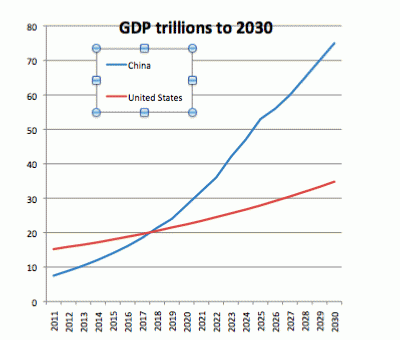Goldman Sachs just revised its growth target for China downward to "just" 7.1%/year for 2015. See here: click here
However, Goldman uses the classic Western rationale:
In economics, there are three factors that contribute to economic growth: labor growth, capital growth and technological advance. Labor growth in China is set to slow. The Chinese society is aging rapidly and the younger generation chooses not to pop out more babies even though Beijing has relaxed its one-child policy. Capital accumulation can only go so far as well and "the current pace of debt accumulation is unlikely to be sustainable in the long term." As for technological advance, China has already played much of the "'catch-up' given the shrinking gap with the highest-productivity nations.
But, China just made a major move to change the way it taxes its people, and this will have a major impact on both its growth and its sustainability. Says Canada's The Globe and Mail: "China moving quickly to roll out property taxes nationwide" - http://www.theglobeandmail.com/report-on-business/international-business/china-moving-quickly-to-roll-out-property-taxes-nationwide/article20294761/
For years, Chinese property owners have enjoyed a free ride to wealth driven by scorching growth in home prices and a lack of property taxes to whittle away the gains. A condo in Beijing has been like a piece of gold: an asset that can sit and gain value, with little cost of ownership.
But three years ago, Chinese authorities began taxing a small fraction of the country's real estate, with pilot projects in two major urban areas, Shanghai and Chongqing.
Now Chinese authorities say they are moving to rapidly roll out property taxes nationwide, in a bid to reshape the country's financial structure and curb some of the incentives for local governments to trammel the rights of farmers and others left behind by China's extraordinary wealth gains.
My
group, Common Ground-NYC, has been advocating a land-heavy property tax
for years, in a series of comments on both Western and Chinese media, as have more influential Georgist, or Georgist-sympathetic, economists like
Michael Hudson and Former Assessor of Greenwich, CT, Ted
Gwartney, who have both had high level meetings with officials in China
and other Chinese groups going back to the 1990s.
Hudson has written in July, 2013: China -- Avoid the West's Debt Overhead: A Land Tax is needed to hold down Housing Prices
How can China avoid the "Western financial disease" -- a real estate bubble followed by defaults and foreclosures? The U.S. and European economies originally sought to avoid this fate by taxing the location's site value. A rent tax was the focus of Progressive Era reforms.
Enacting a rent tax remains China's main challenge to accompany its privatization of real estate and natural resources. If land rent were fully taxed, it would not be paid to banks as interest for rising mortgage loans -- and governments would not have to tax income and sales. Holding down housing debt will reduce labor's cost of living, but not its living standards.
While Western economies shrink in response to debt deflation and fiscal austerity, China continues its unprecedented 30-year growth. Many Western forecasters warn that it must suffer a Western-style financial crash, as if this is a universal path. But China has been industrializing and raising living standards by public credit and infrastructure investment similar to the mixed private/public balance that raised America, Germany and France to world powers as their Industrial Revolutions gained momentum in the late 19th century. Its keys are active public investment in infrastructure, subsidized education and urbanization, rising wage levels and progressive taxation.
Gwartney's justification for China to tax primarily land can be seen in much greater detail here: se.xmu.edu.cn/jzyc/UploadFiles/2014371830317055475115776.pdf. A small portion of this report is shown below:
China is looking for new methods of raising revenue to support its government and services for its people. This paper will introduce the concept of collecting land rent which will provide the needed public revenue for China's economy. It will show how to implement the concept of collecting land rent and methods for valuing land rent. An example of a proposal to fund all of California state and local governments from land rent is presented.
Real estate consists of land and buildings. The nature and characteristics of land and buildings are totally different and the revenue raised from each has totally divergent effects on people, communities, commerce, growth and economic well-being. Buildings are created by man's labor and incur a cost to produce. They deteriorate over time, lose value and need to be replaced. They should be built in suitable locations in order to preserve farm land and natural resources. Land is defined as everything that is freely supplied by nature, which includes all natural resources, such as air, soil, minerals, airwaves, forests and water. Everything not made by man, is categorized as land. Land has no cost to produce and is nature's gift to mankind. Land's uniqueness stems from its distinctive location, fixed supply and immobility. Land is required in the production of all goods and services. Land is our most basic resource and the source of all wealth.
(Note: You can view every article as one long page if you sign up as an Advocate Member, or higher).






